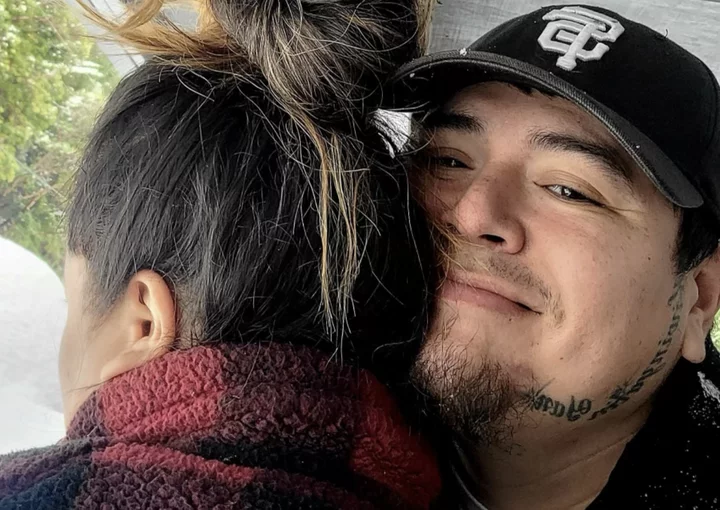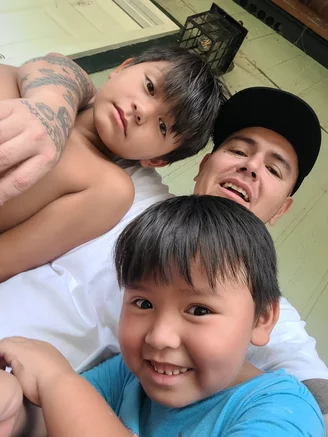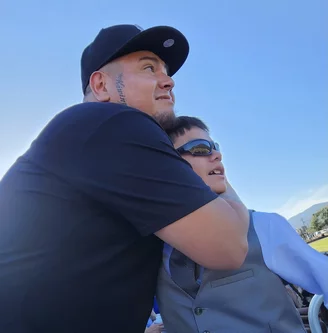Eric Matilton embracing his long-time partner, Carrie. | Photos submitted by the family.
PREVIOUSLY
- Sheriff Honsal is Refusing to Allow a Dying Man’s Organs to Be Donated. Parents and a Donor Organization Say He Won’t Explain Why.
- Honsal Makes About-Face, Will Allow Donation of Organs From Man On Life Support
###
Clyde and Jeanine Matilton don’t understand why their son Eric had to spend more than two weeks on life support before Humboldt County Sheriff William Honsal agreed to let his organs be donated, but three days removed from his death, they felt pride and relief this morning when they learned that Eric’s passing likely saved the lives of at least three other people.
Eric Matilton’s liver and both kidneys were recovered during an autopsy on Saturday, and they’ve been successfully transplanted into three organ donation recipients, according to Robynn Van Patten, chief legal and administrative officer/executive vice president of Donor Network West, a nonprofit organ procurement organization.
“I’m in awe of how much strength they had in the face of everything they’d gone through,” Van Patten said of the Matiltons. “Their strength and courage of conviction got the message about [the importance of] organ donation out, so who knows how many other lives have been saved or will be saved because of what they did.”
She also said that, despite the frustrating delays, she grateful to Sheriff Honsal, who maintained for 14 straight days that protocol precludes the possibility of organ donation when someone dies while in custody at the county jail — only to reverse course at the 11th hour. (In a press release issued Friday afternoon, his department said that after speaking with county counsel, the District Attorney, a forensic pathologist and subject matter experts, Honsal agreed that organ donation could, in fact, proceed without violating protocol.)
“And who knows how many more lives will be saved because the sheriff is revisiting this policy and has a new understanding?” Van Patten said.
Clyde Matilton said he gets that. “But I’m still really, really pissed about the whole thing,” he added. “Why did this have to happen? Why did we have to do this?”
Eric Matilton, a 38-year-old Hoopa Valley Tribe member and father of three, allegedly hanged himself in his jail cell at the Humboldt County Correctional facility on Friday, Nov. 17. His parents said they were in the Bay Area when they were informed the next day that their son had sustained non-survivable injuries and was on life support at St. Joseph Hospital.
Over the next two weeks, they said, they were unable to reach Honsal directly, but they heard from a number of people who had, including sheriff’s deputies, employees of Donor Network West and Hoopa Valley Tribal Chairman Joe Davis, that Honsal was steadfast in his refusal to allow organ donation.
Davis sent them a text he’d received from Honsal about the matter, which read, “Thank you for reaching out. Since Eric is considered an In Custody Death, we have a protocol that mandates a full criminal investigation, which includes an autopsy. Organ donation cannot be considered. We have told the organ donation people many time [sic] but they don’t want to listen. It is unfortunate, but there is no other way.”
Clyde and Jeanine believe Honsal only changed his mind due to public outcry after they went to the media, and they’re convinced that the two-week delay prevented a successful donor match for their son’s heart.
“I mean, that door was open the whole time,” Clyde said. “All [Honsal] had to do was walk through it and he wouldn’t. … By him not working with the donation team or me or anybody and wasting 15 days, my son was unable to give somebody else life. … It’s painful for me, but it also makes me mad.”
###
Van Patten said it’s difficult to say with any certainty whether Eric’s heart could have been successfully donated if things happened sooner.
“There’s a super nuanced, interdependent ecosystem in donation,” she said. “There are many factors that play into that process. … When you are a transplant surgeon and a transplant recipient, there are so many factors that go into play in order for you to be able to receive a heart, and some of it has to do with your immune system, your antibodies, your blood type, your tissue match. There’s a lot of different elements that we look into to find the optimal candidate to make sure that it’s a successful transplant and that your body is less likely to reject it.”
The heart, in particular, is a delicate and intricate organ, and much of its viability for donation depends on the condition of the donor.
“In Eric’s case, he was being kept alive on a ventilator helping him to breathe, have circulation, etc. But he was not declared brain-dead,” Van Patten said.
That fact actually complicated the donation process. When a potential organ donor is declared brain-dead, medical staff know that the patient will die as soon as they’re taken off life support. In fact, they’ve typically already been declared dead, which means that organ recovery can proceed immediately after that patient is taken off of the ventilator.
In cases like Eric’s, on the other hand, where some degree of brain activity remains, doctors must wait after pulling the plug to see if the heart can still keep the body alive.
“They do wait a full five minutes [after the heart stops beating] before we would even begin any kind of procedure, because the heart can sometimes spontaneously resuscitate,” Van Patten explained. “And when that happens, obviously all of us are on the team of, ‘Hey, you can save this person; save this person.’ … Obviously we would never want to cut anyone’s life short.”
That’s true even when the person’s injuries have been declared non-survivable, as in Eric’s case. His was a scenario called “donation after circulatory death,” or DCD, which always involves a bit of uncertainty.
The question, Van Patten said, becomes, “Will this person pass in time so that the organ will remain viable? The heart doesn’t maintain viability for very long.”
When someone in Eric’s condition is pulled off of a ventilator, there’s an immediate reduction in the amount of blood and oxygen traveling through the body, and this lack of circulation can damage the organs.
Van Patten said Eric’s organs remained in good condition throughout his extended time on life support.
“He was a strong guy, a strong young man, which makes this all even more sad in some ways,” she said.
But for the organ recipient and their physician waiting in Los Angeles, the normal uncertainties associated with a DCD were compounded by the bureaucratic red tape here in Humboldt County.
“They were ready to go — all things great — but now, wait. It’s been how many days and [the patient] and their family are waiting for this heart on pins and needles: ‘Will this person pass in time?’” And in this case, Van Patten said, another question arose: “Will the sheriff even allow this to happen?”
During this period of uncertainty — “miraculously,” Van Patten said — another compatible heart became available for the patient in Los Angeles, and while she can’t say for sure, it’s possible that the other donor passed away via brain death, which would have simplified the donation process.
“I don’t know whether [Eric’s heart] was a better overall match than this new one, but they decided to go with the other one because it was more certain,” Van Patten said.
She understands the Matiltons’ frustration. “There’s no question that unnecessary delays in an already incredibly delicate ecosystem can create a problem,” she said. “But I want to be clear that I appreciate the fact that the sheriff’s department is looking into changing its policy, that they ultimately were sufficiently educated to understand that we could still preserve evidence and recover organs so that we can save someone’s life in accordance with Eric and his family’s wishes. And that I hope we will never face this issue in Humboldt County again.”
The Outpost reached out to Honsal via email this morning to ask why it took so long to speak directly with the Matiltons, to county counsel and to the subject matter experts he eventually contacted. We had not received a reply before publication time. We’ll update this post if we get a response.
Meanwhile, Clyde and Jeanine Matilton said they think the Humboldt County Sheriff’s Office and the Coroner’s Office should be separate departments, as they were prior to 2016, to avoid conflicts of interest. And they’re annoyed by online comments celebrating Honsal.
“This thing could have worked from day one but he was hard-core ‘no,’” Clyde said. “Public pressure got to be too much. For me and my family it took 15 days, and going to the press was like the last thing we could do.”
“It was an unusual circumstance,” Van Patten said. “I’m sorry that in this case [Eric’s]heart could not be used. But we know that the other three transplants were successful and his life saved three other lives.”
She said she’s grateful to the Matiltons for their perseverance, and she’s also grateful to the community in Humboldt County for joining the fight.
“They brought it into the public light,” she said, “and there is no question in my mind that their bravery and courage and conviction is going to save even more lives because they’ve made the issue of donation really vivid in the public eye.”



CLICK TO MANAGE